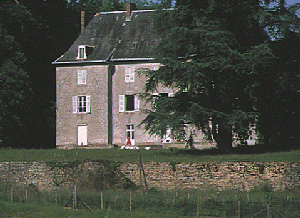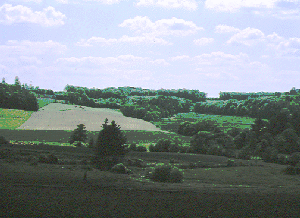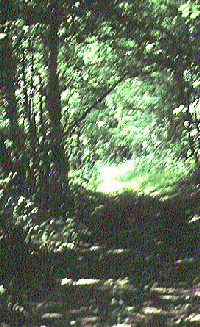|
Toujours
|
||
| If you ask Jacques de Reilhac how long
his family has been at the Château de Freyssinet, he simply
answers 'toujours' and changes the subject. Its a simple fact that
they have always been there. France, even before the Revolution, was home to two different sorts of aristocracy; the courtly nobles and the working nobles. Jacques' forebears were the local Squires, and in Republican France he is now just another working farmer, but with this difference; that his ancestry has supplied him with the responsibility of a big house and a large estate to keep up in times with little sympathy for inherited acres. A number of strategies have helped the de Reilhacs to survive into the nineteen-nineties, of which the latest involves an increasing concentration on field sports. With thirty acres of lake and nearly a square mile of rough shooting, the Freyssinet estate has ample potential in this direction. Freyssinet is in Limousin, the green heart of Western France, about twenty miles south of Limoges in a rolling, wooded countryside of great natural beauty. When I was staying in one of his cottages recently, Jacques showed me around the estate. In the course of our first half-hour walk, we found on the footpath alone tracks of fox, roe-deer and wild boar. About half of the square mile is deciduous woodland, much of the rest arable on which Jacques is careful to favour crops giving good cover for game; maize, barley, buckwheat, Jerusalem artichokes. The cereals, along with a good crop of hay, provide winter feed for the sheep and the red Limousin cattle which graze the lower pastures. Around the gamekeeper's cottage is an area given over to the breeding of pheasant, partridge, quail and ducks. Jacques de Reilhac himself acts as ghillie to all the shooting parties on his estate. The gamekeeper could do it, but nobody knows or loves the place as well as one who was brought up in it and has spent all his life there. Besides, the man is an enthusiast, keen for everybody to appreciate the glories of his countryside. Walking the estate with him is an education. He points out the two-hundred-year-old oak trees and the twenty acres of oaks he planted himself recently; he misses neither a track in the soft ground nor a scraped branch at the wood's edge, and he stops dead in the middle of a glade to listen to a nightingale. The nightingales sing all day in Freyssinet. There are two cottages available for rent at Freyssinet. I stayed in the larger one, which has four bedrooms and two bathrooms as well as a vast living-room with an enormous fireplace and a well-equipped kitchen area. Walls three feet thick, oak beams throughout, heaters in every room, wood for the fire supplied. A convenient way of getting there is to take the overnight boat from Portsmouth to Caen (Brittany Ferries). From Caen to Freyssinet is a comfortable and picturesque day's drive of just on 300 miles. A weekend there is worth thinking about as a break in a journey South. Going South from Limoges on the N20, turn off at Pierre-Buffière and head for Saint-Yrieix-la-Perche on the D19. After about ten miles look out for the signs for Freyssinet-Détente. Détente means relaxation, recreation, relief of tension. If that's what you want, you've come to the right place.
Jacques de Reilhac firmly believes that farmers and sportsmen are the best conservationists. Dedicated to the ecology of his region, he is deeply mistrustful of so-called ecologists, mostly, in his view, town-dwellers who mean well but don't understand the country. Certainly the variety of wildlife on his estate, where redstarts are commoner than sparrows and the fat rabbits sit in the middle of the path until you nearly tread on them, would seem to confirm his view. There is something to be said for leaving the countryside in the hands of people who have been there since toujours. |

|
|

